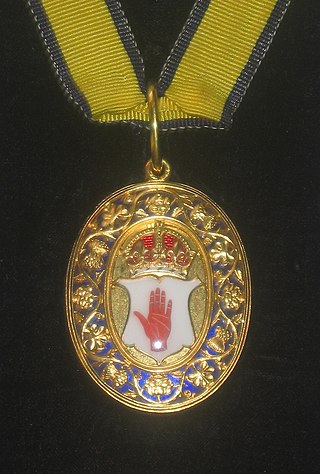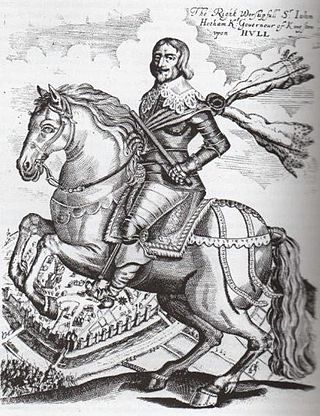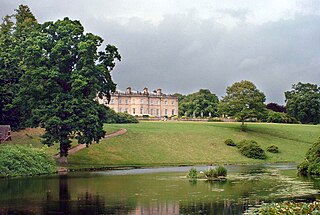
A baronet or the female equivalent, a baronetess, is the holder of a baronetcy, a hereditary title awarded by the British Crown. The title of baronet is mentioned as early as the 14th century; however, in its current usage it was created by James I of England in 1611 as a means of raising funds for the crown.

Duke of Westminster is a title in the Peerage of the United Kingdom. It was created by Queen Victoria in 1874 and bestowed upon Hugh Grosvenor, 3rd Marquess of Westminster. It is the most recent dukedom conferred on someone not related to the British royal family.

Earl Peel is a title in the Peerage of the United Kingdom. The Peel family descends from Robert Peel, eldest son of a wealthy cotton merchant. The family lands, known as Drayton Manor, in the County of Stafford would become more commonly known in modern-day as an amusement park. The family seat is Elmire House, near Ripon, North Yorkshire.

Earl St Aldwyn, of Coln St Aldwyn in the County of Gloucester, is a title in the Peerage of the United Kingdom. It was created in 1915 for the prominent Conservative politician Michael Hicks Beach, 1st Viscount St Aldwyn, known from 1854 to 1907 as Sir Michael Hicks Beach, 9th Baronet, of Beverston. He was Chancellor of the Exchequer from 1885 to 1886 and again from 1895 to 1902. Hicks Beach had already been created Viscount St Aldwyn, of Coln St Aldwyn in the County of Gloucester, in 1906, and was made Viscount Quenington, of Quenington in the County of Gloucester, at the same time he was given the earldom. Both titles are in the Peerage of the United Kingdom. He was succeeded by his grandson, the second Earl, the son of Michael Hicks Beach, Viscount Quenington, Member of Parliament for Tewkesbury, who was killed in action in 1916. Lord St Aldwyn was also a Conservative politician and was Captain of the Honourable Corps of Gentlemen-at-Arms between 1958 and 1964 and 1970 and 1974. As of 2018 the titles are held by his eldest son, the third Earl, who succeeded in 1992.

Baron Inchiquin is one of the older titles in the Peerage of Ireland. It was one of two titles created on 1 July 1543 for Murrough O'Brien, Prince of Thomond, who claimed descent from Brian Boru, a High King of Ireland. The English titles were granted under the policy of surrender and regrant, and therefore conditional upon the abandonment of any Irish titles, the adoption of English customs and laws, pledging of allegiance to the Crown, apostasy from the Catholic Church, and conversion to the Church of Ireland. Murrough was made both Earl of Thomond in the Peerage of Ireland, with remainder to his nephew Donough O'Brien and Baron Inchiquin, with remainder to his male heirs. Following the death of his cousin, Conor Myles John O' Brien in June 2023, Conor John Anthony O' Brien is currently the 19th Baron Inchiquin

Baron Hotham, of South Dalton in the County of York, is a title in the Peerage of Ireland. It was created in 1797 for the naval commander Admiral William Hotham, with remainder to the heirs male of his father. Hotham was the third son of Sir Beaumont Hotham, 7th Baronet, of Scorborough, and in 1811 he also succeeded his nephew as eleventh Baronet. Lord Hotham never married and on his death in 1813 he was succeeded in both titles by his younger brother Beaumont, the second Baron and twelfth Baronet. He had previously represented Wigan in the House of Commons.
Baron Colwyn, of Colwyn Bay in the County of Conwy, is a title in the Peerage of the United Kingdom. It was created in 1917 for the businessman Sir Frederick Smith, 1st Baronet. He had already been created a Baronet in 1912. As of 2024 the titles are held by his great-great-grandson, the fourth Baron, who succeeded his father in that year.
Admiral Sir William Fanshawe Martin, 4th Baronet,, was a Royal Navy officer. As a commander, he provided valuable support to British merchants at Callao in Peru in the early 1820s during the Peruvian War of Independence. He became First Naval Lord in the Second Derby–Disraeli ministry in March 1858 and in that capacity acted as a strong advocate for the procurement of Britain's first ironclad warship. He went on to be Commander-in-Chief, Mediterranean Fleet and in that role provided important assistance during the Italian disturbances in 1860 and 1861, reformed the system of discipline in his fleet and developed a comprehensive system of manoeuvres for steam ships.

The Master of the Household is the operational head of the "below stairs" elements of the Royal Households of the United Kingdom. The role has charge of the domestic staff, from the Royal Kitchens, the pages and footmen, to the housekeeper and their staff. The appointment has its origin in the household reforms of 1539-40; it is under the supervision of the Lord Steward.
There have been three baronetcies created for members of the Anstruther family, two in the Baronetage of Nova Scotia and one in the Baronetage of Great Britain. Two of the creations are extant while one is extinct.
There have been 25 creations of baronets with the surname Smith.

The Sheriff is the oldest secular office under the Crown. Formerly the Sheriff was the principal law enforcement officer in the county but over the centuries most of the responsibilities associated with the post have been transferred elsewhere or are now defunct, so that its functions are now largely ceremonial.
The High Sheriff of Hertfordshire was an ancient Sheriff title originating in the time of the Angles, not long after the foundation of the Kingdom of England, which was in existence for around a thousand years. On 1 April 1974, under the provisions of the Local Government Act 1972, the title of Sheriff of Hertfordshire was retitled High Sheriff of Hertfordshire. The High Shrievalties are the oldest secular titles under the Crown in England and Wales, their purpose being to represent the monarch at a local level, historically in the shires.
There have been three baronetcies created for members of the Gore family, all in the Baronetage of Ireland. All three titles are extant. The family also holds two earldoms and a barony.

There have been four baronetcies created for persons with the surname Miller, two in the Baronetage of England, one in the Baronetage of Great Britain and one in the Baronetage of the United Kingdom. Two of the creations are extant as of 2008.
Three baronetcies were created for persons with the surname D'Oyly, two in the Baronetage of England and one in the Baronetage of the United Kingdom. One creation is extant as of 2008.

The Smithbaronetcy, of East Stoke in the County of Nottingham, is a title in the Baronetage of Great Britain. It was created on 31 October 1757 for the banker George Smith, High Sheriff of Nottinghamshire from 1757 to 1759. He was the eldest son of Abel Smith I (1686–1756) of Nottingham, the 2nd son of Thomas Smith I (1631–1699), the founder of Smith's Bank in Nottingham. His younger brothers included: Abel Smith II, and John Smith, ancestor of Julian Pauncefote, 1st Baron Pauncefote.
Sir William MacMahon, 1st Baronet (1776–1837) was an Irish barrister and judge of the early nineteenth century. He was a member of a Limerick family which became politically prominent through their influence with the Prince Regent, later King George IV. He was the first of the McMahon Baronets of Dublin.
The Smith, later Cusack-Smith Baronetcy, of Tuam in the King's County, was a title in the Baronetage of Ireland. It was created on 28 August 1799 for Sir Michael Smith, 1st Baronet, who was subsequently appointed Master of the Rolls in Ireland. Smith married as his first wife Maryanne Cusack of Ballyronan, County Wicklow. Their son, the second Baronet, assumed the additional surname of Cusack. He served as Solicitor-General for Ireland between 1800 and 1801, and as Baron of the Court of Exchequer (Ireland) from 1801 to 1836. The fourth baronet published a work on warships. The title became extinct on the death of the sixth Baronet in 1970.

Earl of Arran is a title in the Peerage of Ireland. It is not to be confused with the title Earl of Arran in the Peerage of Scotland. The two titles refer to different places: the Aran Islands in Ireland, and the Isle of Arran in Scotland. The Irish earldom is held by the Gore family. The Scottish earldom is a separate title, held as a subsidiary title of the Duke of Hamilton.










